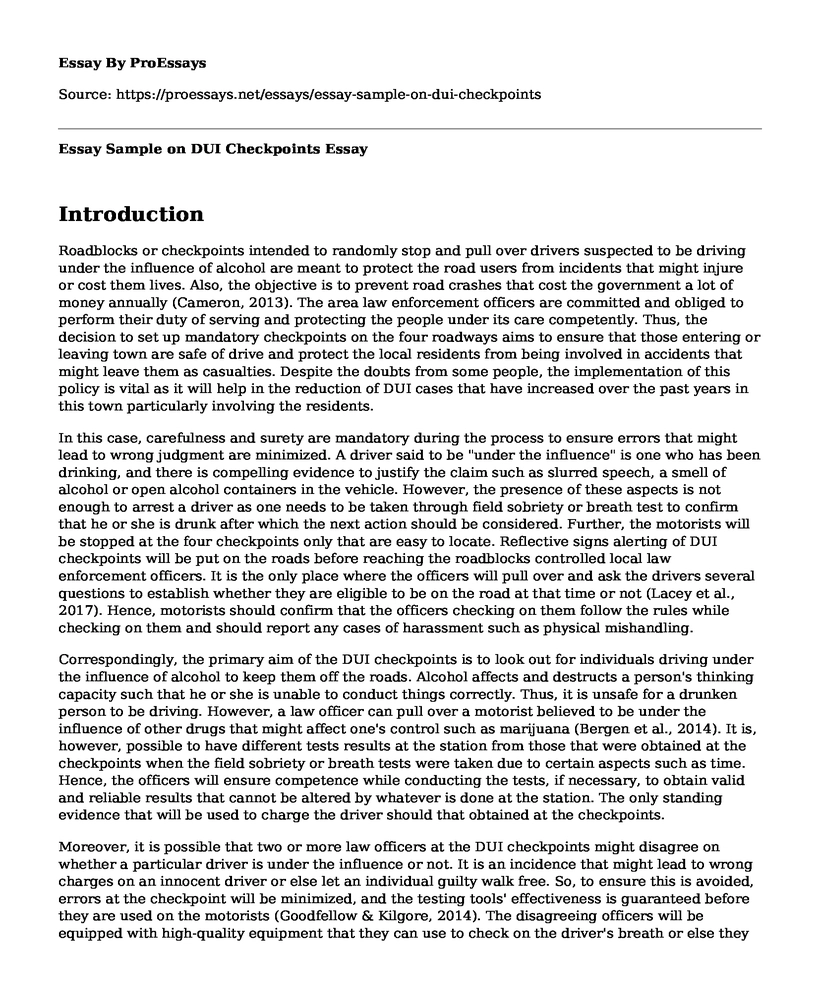Introduction
Roadblocks or checkpoints intended to randomly stop and pull over drivers suspected to be driving under the influence of alcohol are meant to protect the road users from incidents that might injure or cost them lives. Also, the objective is to prevent road crashes that cost the government a lot of money annually (Cameron, 2013). The area law enforcement officers are committed and obliged to perform their duty of serving and protecting the people under its care competently. Thus, the decision to set up mandatory checkpoints on the four roadways aims to ensure that those entering or leaving town are safe of drive and protect the local residents from being involved in accidents that might leave them as casualties. Despite the doubts from some people, the implementation of this policy is vital as it will help in the reduction of DUI cases that have increased over the past years in this town particularly involving the residents.
In this case, carefulness and surety are mandatory during the process to ensure errors that might lead to wrong judgment are minimized. A driver said to be "under the influence" is one who has been drinking, and there is compelling evidence to justify the claim such as slurred speech, a smell of alcohol or open alcohol containers in the vehicle. However, the presence of these aspects is not enough to arrest a driver as one needs to be taken through field sobriety or breath test to confirm that he or she is drunk after which the next action should be considered. Further, the motorists will be stopped at the four checkpoints only that are easy to locate. Reflective signs alerting of DUI checkpoints will be put on the roads before reaching the roadblocks controlled local law enforcement officers. It is the only place where the officers will pull over and ask the drivers several questions to establish whether they are eligible to be on the road at that time or not (Lacey et al., 2017). Hence, motorists should confirm that the officers checking on them follow the rules while checking on them and should report any cases of harassment such as physical mishandling.
Correspondingly, the primary aim of the DUI checkpoints is to look out for individuals driving under the influence of alcohol to keep them off the roads. Alcohol affects and destructs a person's thinking capacity such that he or she is unable to conduct things correctly. Thus, it is unsafe for a drunken person to be driving. However, a law officer can pull over a motorist believed to be under the influence of other drugs that might affect one's control such as marijuana (Bergen et al., 2014). It is, however, possible to have different tests results at the station from those that were obtained at the checkpoints when the field sobriety or breath tests were taken due to certain aspects such as time. Hence, the officers will ensure competence while conducting the tests, if necessary, to obtain valid and reliable results that cannot be altered by whatever is done at the station. The only standing evidence that will be used to charge the driver should that obtained at the checkpoints.
Moreover, it is possible that two or more law officers at the DUI checkpoints might disagree on whether a particular driver is under the influence or not. It is an incidence that might lead to wrong charges on an innocent driver or else let an individual guilty walk free. So, to ensure this is avoided, errors at the checkpoint will be minimized, and the testing tools' effectiveness is guaranteed before they are used on the motorists (Goodfellow & Kilgore, 2014). The disagreeing officers will be equipped with high-quality equipment that they can use to check on the driver's breath or else they can apply their training to ensure the suspect undertakes the field sobriety test as expected. Therefore, they will obtain reliable and valid results that they can use to break the tie between them and settle their dispute regarding whether the driver is sober or drunk. The law officers will make the right decisions regarding the fate of the motorist, and justice will have been served.
References
Bergen, G., Pitan, A., Qu, S., Shults, R. A., Chattopadhyay, S. K., Elder, R. W., ... & Clymer, J. M. (2014). Publicized sobriety checkpoint programs: a community guide systematic review. American Journal of Preventive Medicine, 46(5), 529-539. https://doi.org/10.1016/j.amepre.2014.01.018
Cameron, O. M. (2013). Reducing DUI-related collisions: evaluating the effectiveness of enhanced DUI enforcement (Doctoral dissertation). Retrieved from http://scholarworks.csustan.edu/handle/011235813/267
Goodfellow, M., & Kilgore, C. (2014). DUI offenders' beliefs about DUI statutes and DUI law enforcement: Implications for deterrence. Journal of Drug Issues, 44(3), 269-280. https://doi.org/10.1177/0022042613500052
Lacey, J. H., Wiliszowski, C. H., Tippetts, A. S., & Blackman, K. (2017, May). Determining the effectiveness of flexible checkpoints (DOT HS 812 420). Washington, DC: National Highway Traffic Safety Administration. Retrieved from https://rosap.ntl.bts.gov/view/dot/34987/dot_34987_DS1.pdf
Cite this page
Essay Sample on DUI Checkpoints. (2022, Nov 17). Retrieved from https://proessays.net/essays/essay-sample-on-dui-checkpoints
If you are the original author of this essay and no longer wish to have it published on the ProEssays website, please click below to request its removal:
- The Benefits of Empowering Women to Society Essay Example
- Domestic Violence Resulting in Child Abuse - Research Paper
- Paper Example on Sexual Harassment in Business: Quid Pro Harassment
- Essay Sample on Sports Betting Legalizing: Impact on Gambling Addiction
- Gender Wage Gap: Causes & Earnings Ratio - Essay Sample
- Racial Profiling: Its Use in War Against Terrorism - Essay Sample
- Child Abuse: CAPTA & Prevention Efforts in US - Research Paper







